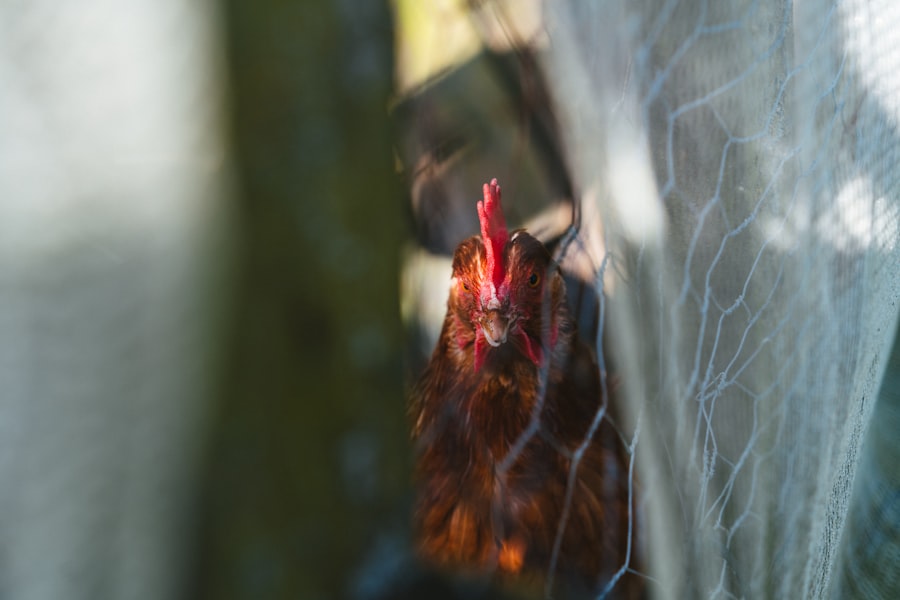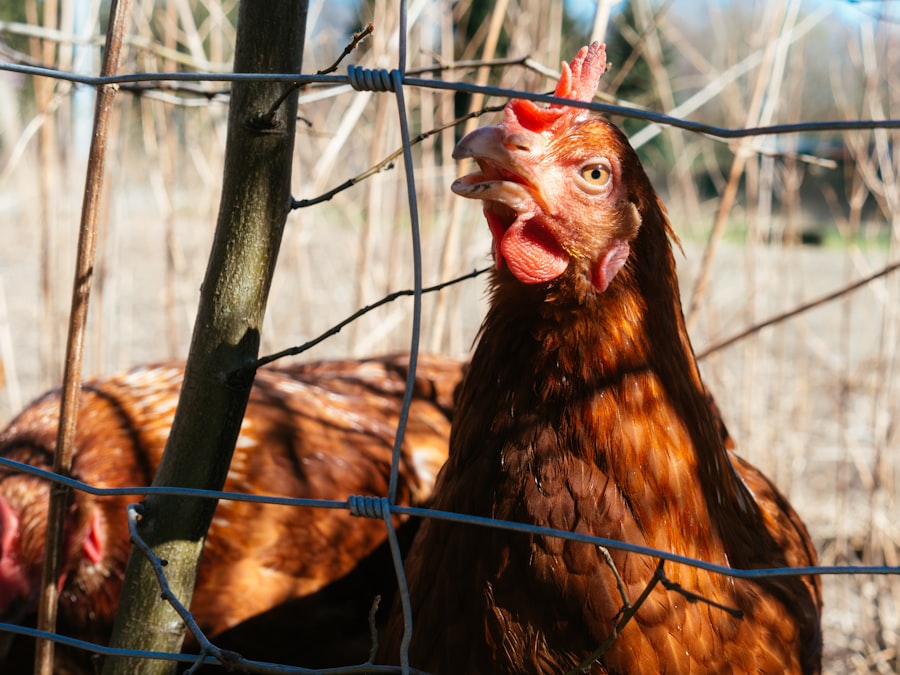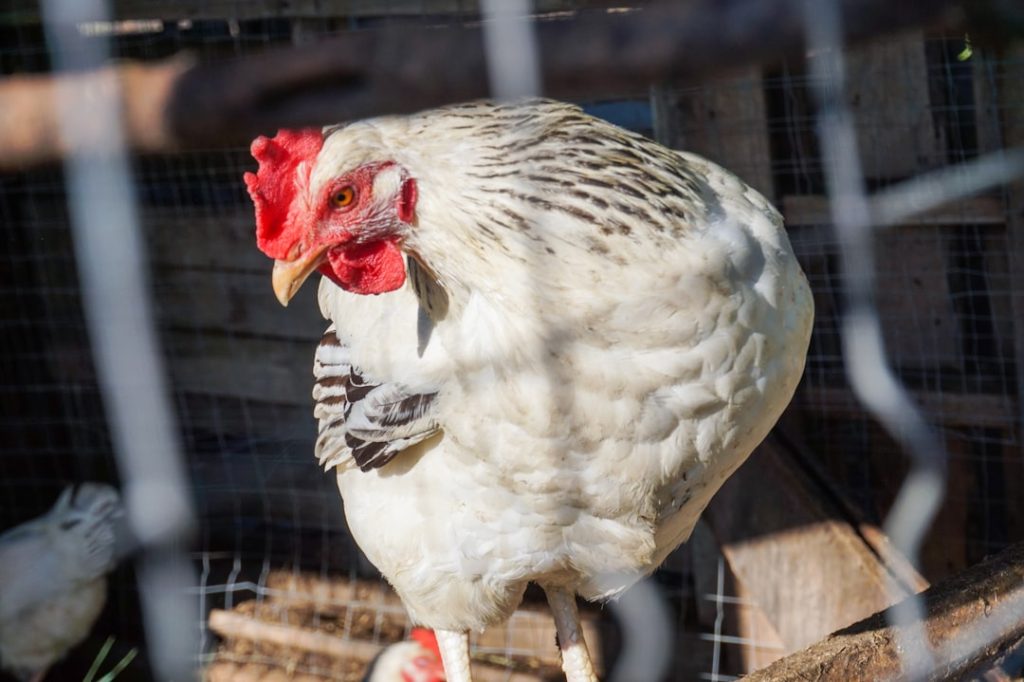A secure run is essential for the safety and well-being of chickens. It provides a protected outdoor space where they can exercise, forage, and exhibit natural behaviors. A secure run protects chickens from predators such as foxes, raccoons, and birds of prey, which pose significant threats to their safety.
It also prevents chickens from wandering into areas where they may be at risk of injury or getting lost. A secure run is crucial for the overall health and happiness of chickens. It allows them to engage in natural behaviors like scratching, pecking, and dust bathing, which are essential for their physical and mental well-being.
The run provides access to fresh air, sunlight, and a variety of plants and insects to forage on, contributing to their overall health. Furthermore, a secure run can help reduce stress and aggression among the flock by providing adequate space and resources. By implementing a secure run, chicken owners can create a safe and stimulating outdoor environment for their birds to thrive in.
This ensures that chickens have the opportunity to express their natural behaviors while remaining protected from potential dangers.
Table of Contents
Key Takeaways
- A secure run is crucial for the safety and well-being of your chickens, protecting them from predators and providing a safe space for exercise and foraging.
- Building a proper enclosure with sturdy fencing and a secure roof is essential to prevent predators from accessing the run and to keep the chickens from escaping.
- Providing enrichment and entertainment such as perches, dust baths, and toys can help keep the chickens active and engaged, reducing stress and boredom.
- Regularly inspecting and maintaining the run, including checking for any damage to the fencing or roof, is important for ensuring the continued safety and security of the chickens.
- Implementing predator deterrents such as motion-activated lights, predator-proof latches, and electric fencing can help further protect the chickens from potential threats.
Building a Proper Enclosure
Protecting from Predators
The enclosure should have a secure roof to safeguard your chickens from aerial predators like hawks and owls. Moreover, it’s crucial to ensure the enclosure has proper ventilation to maintain good air quality and prevent the buildup of moisture and ammonia.
Secure Flooring
A solid floor can help prevent predators from digging underneath and gaining access to your chickens. Consider adding a layer of wire mesh or hardware cloth to the bottom of the enclosure for added protection.
Providing Shelter
It’s vital to provide adequate shelter within the enclosure, such as a coop or nesting boxes, where your chickens can seek refuge from the elements and potential threats. By building a proper enclosure, you can create a safe and comfortable outdoor space for your chickens to enjoy.
Providing Enrichment and Entertainment

In addition to providing a secure enclosure, it’s important to provide enrichment and entertainment for your chickens. This can include adding perches, roosts, and platforms for your chickens to explore and perch on. You can also provide them with toys, such as hanging treats or mirrors, to stimulate their natural behaviors and keep them entertained.
Additionally, you can scatter food and treats around the enclosure to encourage your chickens to forage and engage in natural behaviors. Another way to provide enrichment for your chickens is by introducing new objects and materials into the enclosure on a regular basis. This can include branches, logs, or even a shallow tub of water for them to splash around in.
Providing a variety of textures and objects can help to keep your chickens engaged and prevent boredom. By providing enrichment and entertainment for your chickens, you can create a stimulating outdoor environment that promotes their physical and mental well-being.
Regularly Inspecting and Maintaining the Run
Regularly inspecting and maintaining the run is essential for ensuring the safety and well-being of your chickens. This includes checking for any signs of wear or damage to the enclosure, such as loose wires or broken panels, which could compromise its security. It’s also important to inspect the flooring of the enclosure for any signs of wear or damage that could allow predators to gain access.
Additionally, it’s important to regularly clean the enclosure to remove any debris or waste that could attract pests or pose a health risk to your chickens. In addition to regular inspections, it’s important to maintain the vegetation within and around the enclosure. This includes trimming back any overgrown plants or bushes that could provide cover for predators or pose a threat to your chickens.
It’s also important to regularly check for any signs of pests or parasites within the enclosure, such as mites or lice, which could pose a risk to your flock. By regularly inspecting and maintaining the run, you can ensure that your chickens have a safe and healthy outdoor environment.
Implementing Predator Deterrents
Implementing predator deterrents is essential for protecting your chickens from potential threats. This can include installing motion-activated lights or sound devices around the perimeter of the enclosure to deter nocturnal predators. You can also consider adding predator-proof fencing or barriers around the enclosure to prevent access from ground-dwelling predators.
Additionally, you may consider using predator-resistant materials for the construction of the enclosure, such as heavy-duty wire mesh or hardware cloth. Another effective predator deterrent is the use of guard animals, such as dogs or geese, which can help to deter potential threats from entering the area. It’s also important to secure any food sources or waste bins within the enclosure to prevent attracting unwanted pests or predators.
By implementing predator deterrents, you can create a secure outdoor environment for your chickens to thrive in.
Ensuring Adequate Space and Resources

Providing Adequate Space and Resources
Ensuring adequate space and resources within the enclosure is essential for promoting the health and well-being of your chickens. This includes providing enough space for your flock to move around freely and engage in natural behaviors, such as scratching, pecking, and dust bathing. It’s also important to provide multiple feeding and watering stations within the enclosure to prevent competition and ensure that all of your chickens have access to food and water.
In addition to space and resources, it’s important to consider the social dynamics within your flock. Providing multiple hiding spots or shelters within the enclosure can help to reduce stress and aggression among your chickens by allowing them to establish their own territories. It’s also important to provide adequate nesting boxes within the enclosure for your hens to lay their eggs in a safe and comfortable environment.
Creating a Harmonious Environment
By ensuring adequate space and resources within the enclosure, you can create a harmonious outdoor environment for your chickens. This will allow them to thrive and live happy, healthy lives.
Training and Monitoring the Chickens
Training and monitoring your chickens is essential for their safety and well-being within the enclosure. This includes training them to return to the coop at nightfall by using treats or calling them in with a specific sound or signal. You can also train them to respond to certain commands or cues, such as coming when called or moving away from potential threats.
Additionally, it’s important to monitor your chickens on a regular basis to ensure that they are healthy and behaving normally. Monitoring your chickens can involve observing their behavior, posture, and overall condition on a daily basis. This can help you identify any signs of illness or distress early on and take appropriate action.
It’s also important to monitor their feeding and drinking habits to ensure that they are getting enough nutrition and hydration. By training and monitoring your chickens, you can establish a strong bond with them and ensure their safety within the enclosure. In conclusion, creating a secure run for your chickens is essential for their safety, well-being, and overall happiness.
By understanding the importance of a secure run, building a proper enclosure, providing enrichment and entertainment, regularly inspecting and maintaining the run, implementing predator deterrents, ensuring adequate space and resources, and training and monitoring your chickens, you can create a safe and stimulating outdoor environment for your flock to thrive in. With proper care and attention, you can ensure that your chickens have a secure run where they can live healthy and fulfilling lives.
If you’re looking for tips on how to keep your chickens in the run, you might want to check out this article on The Chicken Coop Country Diner. It offers valuable insights on how to create a safe and secure environment for your chickens to roam and forage in.
FAQs
What is a chicken run?
A chicken run is an enclosed outdoor area where chickens can roam, exercise, and forage while being protected from predators.
Why is it important to keep chickens in the run?
Keeping chickens in the run helps to protect them from predators, prevents them from damaging gardens or neighboring properties, and ensures they get enough exercise and foraging opportunities.
How can I keep my chickens in the run?
You can keep your chickens in the run by ensuring the fencing is secure and predator-proof, providing plenty of space and enrichment within the run, and regularly checking for any potential escape routes.
What should I consider when building a chicken run?
When building a chicken run, consider the size and space requirements for your chickens, the type of fencing needed to keep out predators, and the placement of the run to provide shade and protection from the elements.
What are some enrichment ideas for a chicken run?
Enrichment ideas for a chicken run include providing perches, dust bathing areas, hanging treats or toys, and incorporating natural elements such as logs and branches for chickens to explore and peck at.
How can I train my chickens to stay in the run?
You can train your chickens to stay in the run by using positive reinforcement, such as treats, to encourage them to stay within the enclosed area. Consistency and patience are key when training chickens.
Meet Walter, the feathered-friend fanatic of Florida! Nestled in the sunshine state, Walter struts through life with his feathered companions, clucking his way to happiness. With a coop that’s fancier than a five-star hotel, he’s the Don Juan of the chicken world. When he’s not teaching his hens to do the cha-cha, you’ll find him in a heated debate with his prized rooster, Sir Clucks-a-Lot. Walter’s poultry passion is no yolk; he’s the sunny-side-up guy you never knew you needed in your flock of friends!







